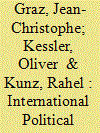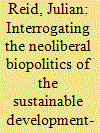|
|
|
Sort Order |
|
|
|
Items / Page
|
|
|
|
|
|
|
| Srl | Item |
| 1 |
ID:
169782


|
|
|
|
|
| Summary/Abstract |
This forum opens a debate that is long overdue: for far too long, the fields of international political sociology (IPS) and international political economy (IPE) have been standing apart. Discussions take place in different conference sections, in different networks that publish in different journals. Yet, this divide is surprising given that the two fields share similar trajectories, theoretical concerns, problématiques, and conceptual challenges. This forum starts exploring this shared terrain: we believe that there is no a priori reason to separate the sociocultural, the political and the economic when we aim at making sense of the world in any meaningful way. We propose that bridging the IPE-IPS divide has tremendous potential for the development of a socio-political economy analysis that, we believe, has two benefits. First, it allows for the opening of new empirical terrains or deepening and widening existing ones. Second, bringing IPE/S back together creates reflexive spaces for more holistic, embodied and contextualised conceptual innovation. The contributors to this forum show each in their own way such empirical and conceptual added value of moving beyond the IPE and IPS divide in order to develop what we call here a socio-political economy of the globe. They focus on various issues, such as the transformation of capitalism from an oil- to a data-dependent accumulation regime with the rising of the so-called ‘digital age’ (Chenou); the profound social, economic and political transformation triggered by urbanisation in the development world (Elias, Rethel and Tilley); emerging global risks and the neglected role of the insurance industry (Lobo-Guerrero); regional development-security nexuses (Lopez Lucia); and business power in climate change diplomacy (Moussu).
|
|
|
|
|
|
|
|
|
|
|
|
|
|
|
|
| 2 |
ID:
127053


|
|
|
|
|
| Publication |
2013.
|
| Summary/Abstract |
One of the defining features of post-Cold War international relations has been the correlation of development practices and rationalities with those of security, and the emergence of what has been called the "development-security nexus." While the development-security nexus remains relevant, semantic shifts in the conceptualization of both development and security are occurring. Demands for development are increasingly tied not simply to demands for "security," but to a discursively new object of "resilience." And this shift from security to resilience is likewise tied to a reconceptualization of development as "sustainable development." Are these, then, merely semantic shifts, or do they signify changes in the rationalities that have shaped the "development-security nexus" during the post-Cold War period? Are the rationalities that distinguish resilience different to those underpinning demands for security? And are those of "sustainable development" different to what was once known simply as "development"? Does the weaving of a nexus of relations between "sustainable development" and "resilience" represent a departure from the "development-security nexus" in some way? And, if so, what explains that shift and what are its political implications? This article answers these questions through an analysis of the neoliberal biopolitics of the "sustainable development-resilience nexus." While sustainable development deploys ecological reason to argue for the need to secure the life of the biosphere, neoliberalism prescribes economy as the very means of that security. Economic reason is conceived within neoliberalism as a servant of ecological reason, claiming to secure life from economy through a promotion of the capacities of life for economy. This is the paradoxical foundation on which neoliberalism constructs its appropriation of sustainable development. Sustainable development and neoliberalism are not the same, nor is the former simply a proxy of the latter, but they do come into contact powerfully on the terrain of their rationalities of security which, on account of the interplay between ecological and economic reason, is increasingly conceptualized as resilience. This surface of contact ought to make for a tense and political field of contestation, but has instead made largely for a strategically manipulable relation between the two doctrines.
|
|
|
|
|
|
|
|
|
|
|
|
|
|
|
|
| 3 |
ID:
104027


|
|
|
|
|
| Publication |
2011.
|
| Summary/Abstract |
As Maria Stern and Joakim Öjendal (2010) rightly point out, the security-development nexus 'matters'. If security and development are today more closely entwined than ever before - 'two sides of a coin', according to Beall and Goodfellow (2006: 52; see also Stewart, 2004) - their conjuncture is not unproblematic. Certainly, there is no doubt that the 'nexus' has its own discursive reality and that the felt need of the international community to pursue development and security policies alongside one another is shaping practice in this regard (a trend that is often taken to be something quintessentially new; however, for a useful argument against such presumed novelty, see Buur et al., 2007a; see also Cooper, 2006). Establishing quite what sort of meanings actors and scholars are attributing to the nexus, therefore, is a task of some importance. It was the explicit aim of the editorial essay in a recent special issue of this journal on 'the Security-Development Nexus Revisited' and the implicit task of the other contributory essays to the same issue. 1 The dissection by the editors, Stern and Öjendal, of the 'infinite' meanings that can be attributed to the security-development nexus helps reveal (and develop) what Chandler (2007) has elsewhere argued: that the nexus is in effect a hollow signifier capable of carrying any number of meanings, and that this capacity is maintained through its (paradoxically) attaining the veneer of a stable and uncontested notion. Such dissection is an undoubtedly important task, from which follows what Foucault would call both critical and effective possibilities ( Dean, 1994).
|
|
|
|
|
|
|
|
|
|
|
|
|
|
|
|
|
|
|
|
|